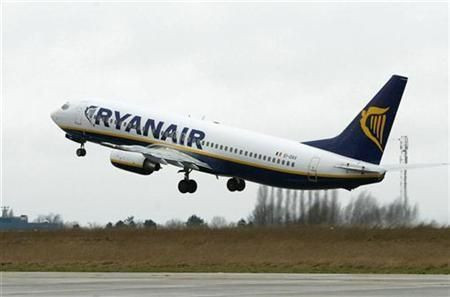Is Ryanair Serious About $10 Flights Between US And Europe?

Ryanair, Europe’s biggest and most profitable airline, just announced a new business model that would see the no-frills carrier work to expand into the United States with airfare as low as $10 on select transatlantic flights.
The airline’s colorful and headline-loving chief executive, Michael O’Leary, spoke of his ambitious plans at the Irish Hotels Federation conference in Meath earlier this week, saying that he’d offer tickets from Europe to New York and Boston for just 10 euros ($13.70) and flights back starting at only $10 (7.30 euros).
If it sounds way too good to be true, keep in mind that a $10 fare comes with a big asterisks that will likely make the price look about 25 percent heftier when all is said and done. O’Leary himself is the first to admit that he’ll charge for everything from booking to baggage and seat selection.
“We can make money on 99 cent fares in Europe,” he enthused at the hotels conference, according to the Irish Independent. “Not every seat will be 10-euro of course, there will also need to be a very high number of business or premium seats.”
O’Leary has said in the past that the “15 percent of the public who will pay for the frills” help subsidize ultra-low fares for the rest of the passengers.
The ever outspoken CEO anticipates flights between up to 14 major European cities and as many as 14 U.S. destinations. But don’t expect to see the bargain-basement tickets advertised anytime soon.
Ryanair won’t commence flights to the U.S. until it secures a fleet of between 30 and 50 long-haul aircraft, O’Leary said. Intense competition for new aircraft orders fueled by the rapidly expanding (and state-backed) Gulf carriers means it could take up to five years before his dream becomes a reality.
Currently, the lowest one-way fares for flights between London and New York hover around $250 if booked months in advance. However, analysts say the Ryanair plan could massively undercut even the cheapest deals now on sale.
“If Ryanair were to enter the North Atlantic market, they could single-handedly control pricing. They would be the undisputed pricing leader,” Henry Harteveldt, an airline analyst with Hudson Crossing, explained to International Business Times. “If they were to offer a business class product, as O’Leary has mentioned, they would certainly pose a major challenge to established airlines.”
Ryainair, like Spirit Airlines in the U.S., is famous for its unbundled fare structure and ultra-low prices. It often flies to smaller, cheaper airports like London Stansted, has a track record of gimmicky fares offset by wild fees and has mulled charges for things as basic as using the toilet.
Despite its questionable customer service practices and punitive fees, Harteveldt said Ryanair could still attract a considerable consumer base for transatlantic flights. “It isn’t like standard economy is that great when you fly on any of the existing airlines running between the U.K. and U.S., where legroom and amenities are both minimal. Certainly there is in-flight entertainment, but there are not many creature comforts.”
Harteveldt said it would be interesting to see the product offering, as current flights do not have reclining seats or window shades. Also, which airports would Ryanair choose to fly to: the major airports or regional alternatives like Providence instead of Boston Logan and Islip instead of New York JFK?
O’Leary has talked about entering the long-haul market for years, and Harteveldt cautioned that it’s best not to make too much of it until the airline makes an official announcement. Long-haul operations, after all, are extremely complex and very dissimilar from inter-European flying, offering a different level of productivity.
Moreover, any shift away from Ryanair’s core European strategy would likely pave the way for a separate division charged with operating the long-haul flights, as has been the case for similar budget carriers like AirAsia and Jetstar. Ryanair would also need to reconfigure its ticketing systems away from the current point-to-point structure to be a credible competitor.
Nevertheless, Harteveldt said if Ryanair does make its U.S.-to-Europe flights work one day, it would be “a credible threat to any airline it competes with.”
© Copyright IBTimes 2024. All rights reserved.






















